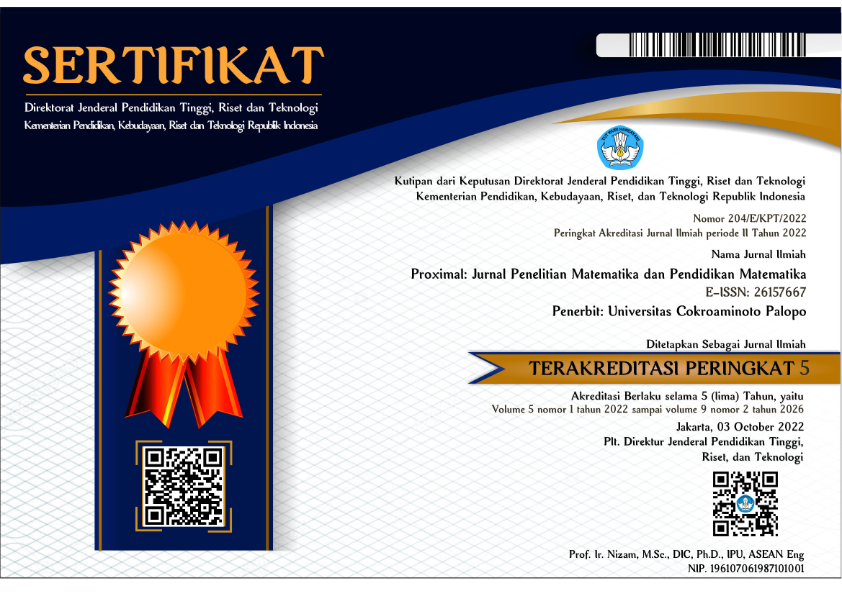Pengaruh Pembelajaran Kontekstual Berbasis Metode Pembelajaran Indoor dan Outdoor Terhadap Hasil Belajar Matematika Siswa Sekolah Dasar
DOI:
https://doi.org/10.30605/proximal.v6i1.1995Keywords:
Pembelajaran Kontekstual, Hasil Belajar Matematika, Metode Pembelajaran Indoor dan OutdoorAbstract
Tujuan penelitian ini adalah untuk mengetahui: mengetahui hasil belajar matematika siswa kelas IV menggunakan pendekatan kontekstual berbasis pembelajaran indoor dan outdoor terhadap hasil belajar matematika. Metode penelitian menggunakan quasi eksperimen design dengan random sampling menggunakan random sampling dengan menetapkan kelas IV SD Negeri Biringkaloro sebagai kelas kontrol dan SD Negeri Tombolo K sebagai kelas eksperimen yaitu kelas yang diberikan perlakuan. Teknik analisis data dalam penelitian ini menggunakan analisis statistik deskriptif. Dengan demikian dilakukan uji normalitas dan uji homogenitas menggunakan uji Kolmodorov-Smirnov, setelah itu dilakukan uji independent sample. Hasil penelitian menunjukkan bahwa rata-rata kelas eksperimen adalah 85,50 sedangkan kelas kontrol adalah 74,64 berdasarkan pengujian data mandiri sampai dengan tes untuk mengetahui ketuntasan hasil belajar mencapai 96,7%, hasilnya 0,000 < 0,05 yang berarti H 0 ditolak untuk dapat mengetahui perbedaan hasil belajar. dan tingkat pemahaman siswa antara kelas eksperimen dan kelas kontrol dilakukan uji N-Gain. Berdasarkan hasil perhitungan diperoleh hasil untuk kelas eksperimen adalah 53,0026455 Menunjukkan peningkatan pemahaman pada kategori sedang maka pada kelas kontrol diperoleh rata-rata N-Gain sebesar 20,06944444
References
Adelia, Vera. 2012. Metode Pengajaran Anak Di Luar Kelas (Ourdoor Study). Yogyakarta: Divapress.
Amir, Almira. 2014. Pembelajaran Matematika SD Menggunakan Media Manipulatif. Jurnal Forum Pedagogik .Vol.6 No.1.P.72-89
Ashari, N. W. (2021, February). Bringing Real Analysis Subject Into Real Life: an Experimental Research for Prospective Teacher of Mathematics Study Program Using Realistic Mathematics Education. In Journal of Physics: Conference Series (Vol. 1752, No. 1, p. 012010). IOP Publishing. DOI: https://doi.org/10.1088/1742-6596/1752/1/012010
Departemen Pendidikan Matematika. 2001. Pengajaran & pembelajaran kontekstual. Universitas Georgia. http://jwilson.coe.uga.edu/CTL
Rodita, A., Isnani, I., & Utami, W. (2020). Metode Outdoor Learning dengan Media Visual pada Pembelajaran Matematika. Jurnal Dialektika Program Studi Pendidikan Matematika, 7(1).
Sutikno, M.Sobri. (2013). Belajar dan Belajar: Upaya Kreatif dalam Mewujudkan
Sri Subarinah. (2006). Inovasi Pembelajaran Matematika SD. Jakarta: Kementerian Pendidikan Nasional.
Safitri, Darni. 2017. “Identifikasi Kesalahan Siswa dalam Memecahkan Masalah Matematika Berdasarkan Metode Analisis Kesalahan Newman . ” Dewantara 3(1): 47-5
Thomas, GJ, & Munge, B. (2017). Pedagogi kerja lapangan luar ruang yang inovatif di sektor pendidikan tinggi: Mengoptimalkan penggunaan teknologi. Jurnal Pendidikan Luar Ruang dan Lingkungan, 20(1), 7–13. https://doi.org/10.1007/BF034009
Downloads
Published
Issue
Section
License
In submitting the manuscript to the journal, the authors certify that:
- They are authorized by their co-authors to enter into these arrangements.
- The work described has not been formally published before, except in the form of an abstract or as part of a published lecture, review, thesis, or overlay journal.
- That it is not under consideration for publication elsewhere,
- That its publication has been approved by all the author(s) and by the responsible authorities – tacitly or explicitly – of the institutes where the work has been carried out.
- They secure the right to reproduce any material that has already been published or copyrighted elsewhere.
- They agree to the following license and copyright agreement.
License and Copyright Agreement
Authors who publish with this journal agree to the following terms:
- Authors retain copyright and grant the journal right of first publication with the work simultaneously licensed under Creative Commons Attribution License (CC BY 4.0) that allows others to share the work with an acknowledgment of the work's authorship and initial publication in this journal.
- Authors are able to enter into separate, additional contractual arrangements for the non-exclusive distribution of the journal's published version of the work (e.g., post it to an institutional repository or publish it in a book), with an acknowledgment of its initial publication in this journal.
- Authors are permitted and encouraged to post their work online (e.g., in institutional repositories or on their website) prior to and during the submission process, as it can lead to productive exchanges, as well as earlier and greater citation of published work.















